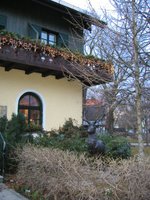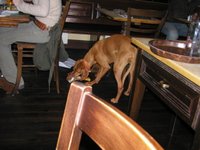This week has been full of food, including free food from Monday 27th to Wednesday 29th March. Of course I'm overjoyed!
本週美食連場,星期一至三(3月27至29日)更是公費吃喝,我很久沒這樣享受過!
My department organised a short course this week, attended by 12 people from outside institutions and the novices to the department. The organisers asked some of us in the department to join the course dinner on Monday and Wednesday, in the name of 'promoting communication with the participants'. Of course, everyone knew there was another motive! So we had dinner at a Bavarian restaurant (see picture). On the first day, I was adventurous enough to order a beef breast fillet cooked in a special soup, only to be stung by the pungency of the soup! As I wasn't prepared for the weird taste, others at the table had fun looking at how I suffered every time I gulped down the soup. I only found out later that the soup was cooked with a horseradish that was responsible for the pungent wasabi-like taste. Lesson learnt ... The next time, I played it safe and ordered the traditional Schweinebraten (roasted pork). After this main dish, I shared with the neighbouring person a dessert called Kaiserschmarren (king's pancake; see picture), a favourite of southern Germany and Austria. A hint for anyone who wants to try this gem: remember to save some space in your stomach during the main course!
本週我系辦一個課程,除了十二個外面的學員外,也有系內的新丁聽講。主辦者邀請系內的同事星期一及三跟學員吃晚飯,其美名為「促進聯絡」,我既然有出席,就自然不客氣了。晚飯在一家有巴伐利亞特色的酒吧(見圖),吃的是道地菜,第一日不知好歹叫了一客湯煮牛胸肉,怎料那湯喝一口便很刺喉和鼻,連忙叫苦,其他人也忍俊不禁,原來湯是用辣根(一種植物)煮,怪不得有一種日本芥末味!第二次學乖了,吃了一客德國烤肉,之後跟鄰座合吃一道德國南部及奧地利地道甜點皇帝熱煎餅(見圖),如果他日有機會品嘗,記得主菜時勿吃得太飽!


Tuesady was Institute Day, which featured many scientific talks followed by a free dinner at our canteen. Others who didn't attend also caught the news, including some of the course participants. No wonder their course brochure said that the only expense was their transport.
星期二是研究所日,演講完畢全體聽眾移師至飯堂晚膳,其他沒出席演講的也聞風而至,包括幾位學員,怪不得課程簡介說學員祇須支付交通費了。
On Friday, our department held a farewell breakfast for one of our colleagues, and we had lots of German sausages. One of the most popular was the local Weisswurst (white sausage), for which it was recommended that the skin be removed before eating. The removal is not necessary for good-quality sausages, but I followed the locals' advice anyway. The easiest way to 'peel' the sausage was to cut the sausage in the middle along its length, and with some dextrous surgical skills the skin would come off eventually. Another piece of advice came from a Bavarian student, who said that 'the sausages should not hear the 12 o'clock bell'. That was what the customers were told in the old days because there was no refrigeration and the sausages, which were made the night before being sold, would not keep for very long. A non-Bavarian German colleague found this saying mildly amusing and couldn't help but make fun of the Bavarians' inability of making sausages that last longer. Bavarians are the butt of all jokes in Germany, and it's hardly surprising that Bavarian sausages are also another source of amusement!
星期五我們吃早餐歡送一位同事,吃的是德國香腸,最多人吃的是巴伐利亞的白香腸,本地人着我吃前先剝皮,在香腸中間沿着其長度開刀便行,過程有如為香腸動手術。其實吃白香腸不一定要剝皮,品質好的便不用。有個本地巴伐利亞州的博士生說,「白香腸不可以聽到十二點的鐘聲」,因為古時沒冷藏,前一晚做好的白香腸得儘快吃掉,所以賣香腸的都會對顧客如是說。另一個來自德國另一個州的同事聽罷,便取笑說巴伐利亞人的製香腸技術不如人才有此下策。德國人素來愛取笑巴伐利亞的鄉下佬,巴伐利亞的香腸當然也可成為開玩笑的題村!
Today, I had lunch with a Taiwanese friend at a restaurant and had some haxenbachen (roasted pig legs). There was an unusual customer who also enjoyed the treat:
今天跟一個台灣朋友在餐廳吃烤薰蹄(燒豬腳),遇上一個識飲識食的非一般顧客:

Dining in restaurants, it seems, is not the sole privilege of humans.
在餐廳用膳,原來不祇是人的專利。
本週美食連場,星期一至三(3月27至29日)更是公費吃喝,我很久沒這樣享受過!
My department organised a short course this week, attended by 12 people from outside institutions and the novices to the department. The organisers asked some of us in the department to join the course dinner on Monday and Wednesday, in the name of 'promoting communication with the participants'. Of course, everyone knew there was another motive! So we had dinner at a Bavarian restaurant (see picture). On the first day, I was adventurous enough to order a beef breast fillet cooked in a special soup, only to be stung by the pungency of the soup! As I wasn't prepared for the weird taste, others at the table had fun looking at how I suffered every time I gulped down the soup. I only found out later that the soup was cooked with a horseradish that was responsible for the pungent wasabi-like taste. Lesson learnt ... The next time, I played it safe and ordered the traditional Schweinebraten (roasted pork). After this main dish, I shared with the neighbouring person a dessert called Kaiserschmarren (king's pancake; see picture), a favourite of southern Germany and Austria. A hint for anyone who wants to try this gem: remember to save some space in your stomach during the main course!
本週我系辦一個課程,除了十二個外面的學員外,也有系內的新丁聽講。主辦者邀請系內的同事星期一及三跟學員吃晚飯,其美名為「促進聯絡」,我既然有出席,就自然不客氣了。晚飯在一家有巴伐利亞特色的酒吧(見圖),吃的是道地菜,第一日不知好歹叫了一客湯煮牛胸肉,怎料那湯喝一口便很刺喉和鼻,連忙叫苦,其他人也忍俊不禁,原來湯是用辣根(一種植物)煮,怪不得有一種日本芥末味!第二次學乖了,吃了一客德國烤肉,之後跟鄰座合吃一道德國南部及奧地利地道甜點皇帝熱煎餅(見圖),如果他日有機會品嘗,記得主菜時勿吃得太飽!


Tuesady was Institute Day, which featured many scientific talks followed by a free dinner at our canteen. Others who didn't attend also caught the news, including some of the course participants. No wonder their course brochure said that the only expense was their transport.
星期二是研究所日,演講完畢全體聽眾移師至飯堂晚膳,其他沒出席演講的也聞風而至,包括幾位學員,怪不得課程簡介說學員祇須支付交通費了。
On Friday, our department held a farewell breakfast for one of our colleagues, and we had lots of German sausages. One of the most popular was the local Weisswurst (white sausage), for which it was recommended that the skin be removed before eating. The removal is not necessary for good-quality sausages, but I followed the locals' advice anyway. The easiest way to 'peel' the sausage was to cut the sausage in the middle along its length, and with some dextrous surgical skills the skin would come off eventually. Another piece of advice came from a Bavarian student, who said that 'the sausages should not hear the 12 o'clock bell'. That was what the customers were told in the old days because there was no refrigeration and the sausages, which were made the night before being sold, would not keep for very long. A non-Bavarian German colleague found this saying mildly amusing and couldn't help but make fun of the Bavarians' inability of making sausages that last longer. Bavarians are the butt of all jokes in Germany, and it's hardly surprising that Bavarian sausages are also another source of amusement!
星期五我們吃早餐歡送一位同事,吃的是德國香腸,最多人吃的是巴伐利亞的白香腸,本地人着我吃前先剝皮,在香腸中間沿着其長度開刀便行,過程有如為香腸動手術。其實吃白香腸不一定要剝皮,品質好的便不用。有個本地巴伐利亞州的博士生說,「白香腸不可以聽到十二點的鐘聲」,因為古時沒冷藏,前一晚做好的白香腸得儘快吃掉,所以賣香腸的都會對顧客如是說。另一個來自德國另一個州的同事聽罷,便取笑說巴伐利亞人的製香腸技術不如人才有此下策。德國人素來愛取笑巴伐利亞的鄉下佬,巴伐利亞的香腸當然也可成為開玩笑的題村!
Today, I had lunch with a Taiwanese friend at a restaurant and had some haxenbachen (roasted pig legs). There was an unusual customer who also enjoyed the treat:
今天跟一個台灣朋友在餐廳吃烤薰蹄(燒豬腳),遇上一個識飲識食的非一般顧客:

Dining in restaurants, it seems, is not the sole privilege of humans.
在餐廳用膳,原來不祇是人的專利。
Comments